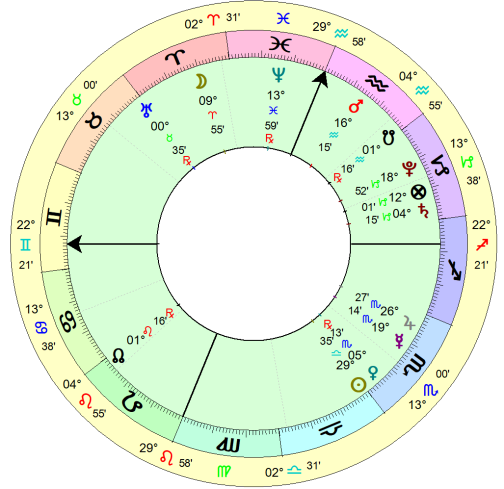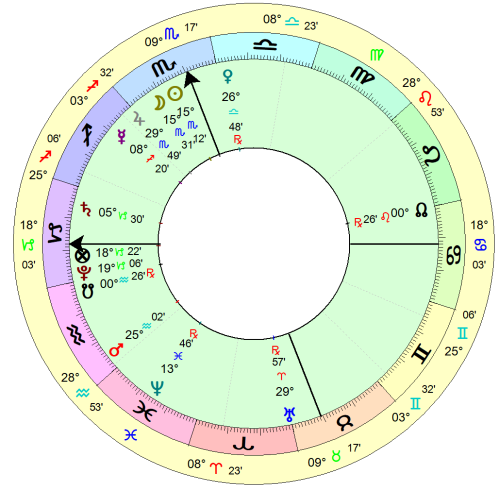This week, we’re the first house in astrology.
The first encounter with the first house is that fabulous point that causes every newbie astrologer to marvel. They realize that reading the sun sign horoscopes they had been forcing themselves into, like square pegs into to-o-small round holes from the perspective of the first house often causes those mass-marketed promises to land in a way they hadn’t before—at least if they’re written by an astrologer that knows what they’re doing.
They begin to learn that this is the point that makes the most sense when they view their spirit, identity, motion through the world, and fundamental personality through its lens. This turn is especially fabulous for the nascent astrology enthusiast, because, when we encounter the first house, we encounter the most important point within an astrological chart.
But what is the first house? Let’s turn our house music back on and take a deep dive.
Astronomically speaking, the first house is the part of the sky that is ascending over the eastern horizon at the astrological moment. It is that point where things are set into motion, the point of the sky that has the strongest bearing on the overall outcomes of what comes into being at that very moment. The first house is determined by the ascendant degree, the point where the ecliptic hits the horizon.
The ascendant degree represents the meeting point of the sky and the earth, where everything that was held in promise underneath the earth enters onto the scene. Here, matter and spirit join and create something new, like water in stone becoming wine. This is the point of incarnation, where the soul enters the body, according to tellings of cosmic myths. Indeed, I could wax poetic at length about the magic and myth of this point.
In the Hellenistic tradition, an astrological chart was likened to a boat containing the life of a native (or of an event, if they were looking at an inception chart). Remember that the Mediterranean lifestyle depended in no small part upon the ability of competent helmsmen to steer boats containing cargo and people safely to their destination, so the metaphor is an apt one. In modern life, we might consider this as the pilot of an aircraft, or really, any vehicle.
Essentially, if the chart is a boat, a boat has a rudder, and a place on the boat where one stands to turn that rudder to steer the boat safely to its destination. The planet that rules the ascendant degree is the captain of the boat, or the pilot of the plane, or the driver of the bus… pick your metaphor. That planet’s condition describes how well it will be able to manifest the best outcomes for a person’s life.
Demetra George explores this more richly in her books Astrology for the Authentic Self and Ancient Astrology in Theory and Practice (affiliate links ahoy). Tolle, lege.
The helm of the ship, or the cockpit of a plane, or the driver’s seat, is the ascendant, which we refer to as the first house. Regardless of the house system you’re using (I discussed that a little bit in the last entry in this series), the first house is always related to the ascendant degree.
But when it comes down to it, this degree and the house that contains it, the first house, are the most important point in a chart and the starting place for reading anything.
To wit, if I don’t know at least your rising sign, I’m kind of at a loss for where to begin with a reading of your nativity. That doesn’t mean I can’t, it just makes it harder to frame any judgments I might derive relative to you specifically.
But what does it mean, Nate?
Every house has multiple layers of meaning. Throughout this series, I’m going to distinguish between the internal meanings of a house, namely what you carry in your subjective experience and personality, and the external meanings of a house, being the way in which a house physically manifests in the material world. In every case, there are important “meta” significations that impact both internal and external experiences.
In fact, let’s start with the “meta” significations of the first astrological house.
From a 30,000-foot view, the first house, together with its ruler, describes the overall circumstances and general positive or negative outcomes of a person’s life. We might say that the narrative being played out by the ruler of the first house and any planets contained within the first house point to a person’s plotline. This house describes how a person both bears the story being told about them and how they tell their own story.
Internally, the first house describes a person’s underlying motivation and baseline personality. What drives them unconsciously? What patterns their life? What is their way of being in the world?
Externally, the ascendant degree and the first house describe a person’s appearance, their preferred style of dress, how their internal experiences join to outward style to create a peculiar behavioral style. In either case, this expression is conditioned by the sign on the ascendant degree in their chart.
For example, someone with Aquarius on the ascendant will have an underlying motivation and baseline personality keyed to maintaining intellectual security and bearing the wisdom that they accumulate over a lifetime within the context of a community. They move through groups knowing precisely it is what they believe and remain committed to their peculiar why in such a way that it gives them a set-apart-ness that causes them to appear aloof to others. Put Saturn in an earth sign and you wind up with someone who manifests this with ruthless practicality and resistance to trends (all my Capricorn rising babies with Saturn in Cap, I see you).
But, put that Saturn in a water sign such as Pisces, and you will see much more commitment to matters of emotional knowledge and a personal style that is much more open to the suggestions of trends and passing dreams (barring, of course, other influences).
Meanwhile, an individual with the first house falling in Virgo will find their life plotline conditioned to matters of applying knowledge in material fashion, improving their own physical circumstances and those of the people who journey alongside them, and regarding any situation wherein knowledge may be applied with scrutiny. They’ll tend towards caution, skepticism, precision, and anxiety.
You may notice that I’m deriving these sign interpretations more from the planets that rule them, which is the natural order of determining meanings in the classical astrological model. That’s because the expression of a person’s first house primarily determined by the ruler of the first house, with its expression modified by its own placement by sign and house, as well as other conditions.
(Did you buy Demetra’s book yet? DO IT NOW)
There is, however, one important consideration here: this way of interpreting presumes that there are no other planets in the first house. If we have another planet in the first house, especially one very close to the rising degree, that planet is sitting in the driver’s seat, and its nature and condition will impact the behavior, style, and circumstances of a person in much more flagrant colors than the ruler of the first house alone.
For example, consider someone with Virgo rising, as I described above, but who has Jupiter in Virgo conjoined the ascendant (someone dear to me has this configuration). This means a couple of things: one, the person’s baseline operating personality will be ruthlessly committed to perfection in their search for truth, and that can take them in the direction of a cheery, winsome fundamentalism (which can go either towards belief or skepticism). Their behaviors may have a peculiar doctrinaire flavor, but what prevents them from becoming the lovechild of Pat Robertson and Richard Dawkins is the fact that Virgo is mutable, and Jupiter is naturally adaptable given its warm and moist nature.
Meanwhile, this person has their natal Mercury, their ascendant ruler, in Capricorn in the 5th, configured to the trine of Jupiter (which is a beneficial configuration for Jupiter’s positive expression). This means that their baseline operating priorities are weighted towards matters of the fifth: toward their children, and especially toward their children’s success. They want to know that their kids are alive, employed, and financially solvent.
We can summarize this interpretive principle for the first house like so:
The placement of the ascendant ruler by house describes the overall priorities and plotline of a person’s life. The ascendant ruler in the 7th gives us either a romantic comedy or a heist film. The ascendant ruler in the 4th gives us a nostalgia piece. The ascendant ruler in the 12th gives us a psychological thriller, and so forth.
Meanwhile, planets placed in the first house act like competing voices that focus a person’s peculiar narrative.
These rules don’t just work for natal astrology; they work for all branches! For example, in a horary with the ascendant ruler (or the Moon) in the 10th, I might surmise that there’s a heavy emphasis on career, vocation, or public image in the person’s query, even if the question isn’t about a career matter at all.
Interpreting the First House Ruler through the Houses
Here’s the fun part. What I want you to try on, especially if you’re just learning astrology, is to use this formula to learn how this interpretation feels:
My first house ruler is in the [nth] house. That means in my life, the pilot is steering my life in the direction of [nth] house matters.
And if you have planets in your first house:
The ruler of [nth] house is in my first house. That means in my life, priorities of the [nth] house compete with my first house priorities and influence my daily life and actions.
Here we go!
Ruler of the first house in the first house: the pilot of my chart steers my life in the direction of my own circumstances, priorities, and self-development. My priorities are aligned closely with improving my own circumstances and understanding of myself. I desire to know who I am.
NB: when you use quadrant houses, it’s important to note that sometimes the first house ruler in the first house can fall in a sign that’s not the rising sign. This creates a situation called an aversion, where the pilot can’t see the control stick. In this instance, manifesting the best outcomes for yourself requires more focused effort and remediations.
Ruler of the first house in the second house: the pilot of my chart steers my life, motivation, and behaviors in the direction of material and immaterial resources, financial security, and ensuring that I have enough to support myself. I desire to have enough.
Ruler of the first house in the third house: the pilot of my life steers my life, motivation, and behaviors in the direction of my local community (my zip code), communication, exchange of words and ideas, my siblings if I have them, relatives, regular folk, functional learning, “street smarts,” and being a neighbor. I desire to belong.
Ruler of the first house in the fourth house: the pilot of my life steers my life, motivation, and behaviors in the direction of my home, the land, my parents, my traditions, and that which I inherited from the living. It also draws my focus to the legacy that I will leave for those who come after me. I desire a legacy.
Ruler of the first house in the fifth house: the pilot of my chart steers my life, motivation, and behaviors in the direction of self-expression vis-à-vis creative work, sensuality, procreation, nurture, children, enjoyment, and having a good time. I desire to create.
Ruler of the first house in the sixth house: the pilot of my chart steers my life, motivation, and behaviors in the direction of disciplined action, physical rigor, service to others, and being responsible for the needs of those who depend upon me. I desire a project.
Ruler of the first house in the seventh house: the pilot of my chart steers my life, motivation, and behaviors in the direction of the other: to relationships, to partnerships, to coalitions and collaboration, and possibly to open enmity and strife with others, toward pursuit of the other for good or for ill. I desire an equal.
Ruler of the first house in the eighth house: the pilot of my chart steers my life, motivation, and behaviors in the direction of life’s unavoidables: fear, death, and debt. I desire gravitas.
NB: this does not mean that you are morbid or have something wrong with you; the gift of this placement is your ability to walk where others fear to tread, and that’s a blessing in a culture who has no tools to engage well with the beauty of death. More on that when I write on the eighth house.
Ruler of the first house in the ninth house: the pilot of my chart steers my life, motivation, and behaviors in the direction of philosophy, higher learning, theory, understanding, matters of faith and belief, and deepening my engagement with all matters of ultimate concern. I desire faith, hope, and love.
Ruler of the first house in the tenth house: the pilot of my chart steers my life, motivation, and behaviors in the direction of career, vocation, and the visible impact that my actions have in the world. I desire to make a name for myself.
Ruler of the first house in the eleventh house: the pilot of my chart steers my life, motivation, and behaviors in the direction of friends, groups, community, chosen family, and fidelity to others and their fidelity to me. I desire a community.
Ruler of the first house in the twelfth house: the pilot of my chart steers my life, motivation, and behaviors in the direction of retreat, hidden matters, sorrow, and succor. I desire to be apart to be myself.
Wondering how to interpret the ruler of the first house in your own chart with all other factors considered? There’s no better way to do so than to get a second set of eyes on your chart. Pop over and book an astrology session with me and we’ll see exactly where your pilot’s steering your plane—and how we can help them out, if they need it!
Book an Astrology Reading Today!
Featured image by Roberto Delgado Webb via Unsplash









